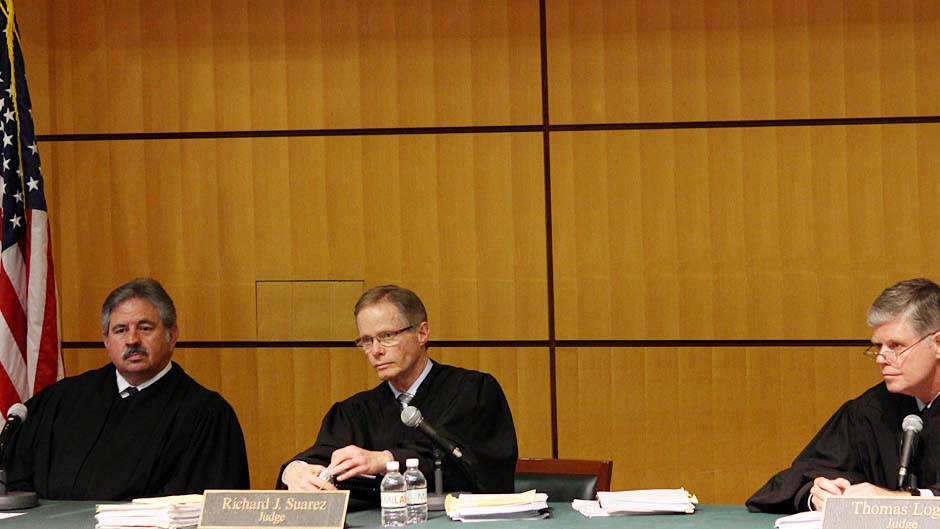"The event is the biggest of the year for the 1Ls," said Professor Jill Barton, who teaches Legal Communication and Research Skills at Miami Law, previously clerked for the Third DCA and was the prime mover behind the annual event. "Holding court on campus fits perfectly with the 1L curriculum. At this point in the semester, first-year law students are developing their persuasive writing and oral advocacy skills. Having the chance to study real-life appellate cases by reading the parties' briefs and observing oral arguments allows students to make the connection between their LComm assignments and the practice of law."
Throughout the morning, a total of five civil and criminal cases were presented. "Through the cases today," Professor Barton said, "students saw legal issues in criminal law, civil procedure, contract law, and family law come to life." The two sessions of oral arguments were held to a packed house.
"This is an extraordinary opportunity for our students to observe judges and attorneys in action," said Professor Christina Frohock, who also teaches LComm. "The judges even inserted teaching moments in their questions, explaining the court's standard of review and prompting attorneys to restate what they seek on appeal."
After the arguments, the panel invited questions from the students. In the dialogue that followed, the judges emphasized the importance of integrity, preparation, and professionalism.
"The first thing I look at is preparation," said Judge Suarez, J.D.'81, cum laude. "We are an active bench and we read the record, we've read the brief, and our questions are about what is going on. As an attorney, if I expected the court to be well prepared, I think I can expect the attorney to be well prepared. If you know your cases back and forth, you know where the weak points are and you should be prepared to answers the questions. Nine out of 10 times you know the question. It may not be good for your case, but answer it anyway to the best of your ability. And be respectful to one another – it is not like what you see on L.A. Law."
The judges also stressed the importance of an attorney's reputation, and advised the students that they have already begun building their professional standing.
"Having the opportunity to watch these arguments is not only a tremendous opportunity in my preparation for LComm oral arguments," said David Garcia-Pedrosa, a first-year law student from Miami, "but also a unique experience to see an appellate court argument."
The timing of the Third DCA's visit could not have been better, since students are currently practicing effective oral argument strategies in their Legal Communication and Research Skills classes. "I am preparing for my oral arguments in LComm II," said another first-year, Jordan Hadley, from Jacksonville. "Being able to see the attorneys has been highly beneficial by allowing me the occasion to see speech, timing, and the format of real appellate oral arguments." Judge Logue advised the students to "adhere to strict accuracy."
"Be careful of what you say: When you represent what the record is, the issue is your credibility," the judge said. "We independently review the record, so avoid the temptation. You have to think about the standard of review – there is not a jury. Also, make sure to find a balance between life and the law."
Judge Logue, appointed by Governor Rick Scott to the Third District Court of Appeal in July 2012, has taught Florida Constitutional law as an adjunct professor at Miami Law.
Judge Suarez received a Bachelor of Music degree, cum laude, from the University of Miami, where he was awarded a Presidential Scholastic Scholarship. He went on to receive a Master of Music degree, also at Miami. At Miami Law, Judge Suarez was a member of the Moot Court Board and was on the Dean's List.
A fellow Miami Law graduate, Judge Fernandez, J.D.'92, was born in Santa Clara, Las Villas, Cuba, in 1952. He emigrated to the United States in May 1962 at the age of 9, with his parents. He was admitted to the Florida Bar in June 1993 and to the U.S. District Court for the Southern District of Florida in January 1996.

